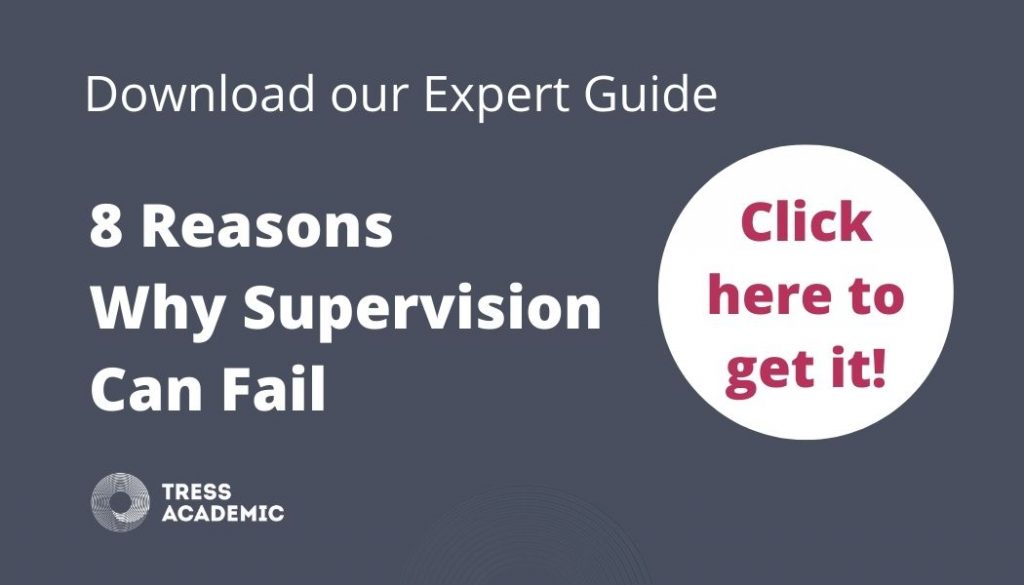Are you wondering what one might typically be able to expect from a good PhD supervisor? Are you uncertain if your own supervision ticks all the boxes? Are you having one issue or another with supervision and you’re not sure if this is normal? We’ve compiled this exposé of ‘Five pillars of good PhD-supervision’ to give you more clarity on what to expect, plus an added bonus self-check ‘How good is my PhD supervision?’
We often find that PhD students are uncertain as to what they might actually be able to expect from a PhD supervisor, and what actions a good supervisor would or wouldn’t take. We also often meet PhD students who are having issues with supervision, but do not know if what they’re experiencing is common, normal or actually an exception.
There is evidence from a range of studies of how important good supervision is for the PhD experience, process and outcome (Woolston, C. 2017, Max Planck PhD-net 2018). It is quite clear, that the difficulties in undertaking a PhD study become easier with a great supervisor by your side. That is not to say that individual PhD students- who do not have good supervision won’t make it, but there is a significant difference between just ‘completing ’ or handing in a great dissertation with a fantastic learning experience behind them. Everyone can benefit from the expertise of a superb and experienced supervisor.
The aim of this blog-post is to give you an idea about these five essential elements, which together constitute the pillars of good PhD-supervision. This can help you to make an informed judgement about your personal situation and eventually encourage you to start improving aspects of your supervision, if you feel it necessary. For those of you who are right at the beginning of a PhD and have not yet chosen a supervisor (or not appointed all your supervisors), our five features can give you some orientation of whom to pick. Ideally, you get a trusted supervisor who will meet all five features. If you’re curious how yours stack up, we’ve included a self-check ‘How good is my PhD-supervision?’ for you to take at the end of this post!
However, there is no black and white standard of exactly what your supervisor should do, so it can be difficult to evaluate based on a formula of “if this does not happen, then they’re not a good supervisor”. The boundaries are rather grey and a good relationship to your supervisor does not hinge upon the fulfilment of a single aspect. There are many ways for good supervision to express itself.
Still, we believe there are a couple of features that are essential and constitute “good supervision” and we want to outline these for you. If your supervisor lacks several of these essential features, it can be tricky to get sufficient support for your PhD in the long run.
Today in many countries and disciplines, it is common to have a supervisory team, so you are advised by multiple people. The responsibilities are often shared between one main supervisor and 1-3 (and eventually more) co-supervisors. Supervisors may also be called mentors or advisors(just so you know that this is the same thing unless your PhD regulations specify another meaning in your case).
So here are our five pillars of good PhD supervision:
1. Guidance
Guidance is the no.1 pillar of good supervision. You should receive guidance from your supervisor for all matters – big and small – regarding your PhD study. Your supervisor should give guidance in particular, regarding:
- Your research and individual aspects hereof. What do you research and how?
- The planning of your project. That means guidance on how to design, set-up and carry out a project in the given time span.
- The outcomes of your PhD in terms of publications, patents or potential applications.
- The educational part of your studies. How you acquire the necessary skills to succeed with your project, and in a broader sense, how to become an independent researcher. This also includes complementary skills courses like the ones from TRESS ACADEMIC.
- The administrative aspects around your
PhD , suchas: PhD regulations of your university, deadlinesand documents that have to be handedin to your graduateprogramme ,composition of a supervisory team, examination board, submission of your dissertation, etc…
2. Expertise
Good supervision means to have a supervisor who has expertise in the very subject area in which you undertake your PhD project. So they should have excellent knowledge of the discipline, know the latest innovations and cutting-edge questions, can anticipate future trends, and are recognised scholar in your scientific community. Their research interest is your research interest and vice versa.
Ideally, your supervisor is also trained pedagogically on how to supervise PhD students. The pedagogic expertise is complementary to the research expertise. You won’t benefit much from a superstar from your field who shows little interest in transferring their knowledge to you, or does not concern themselves with how they can help you learn.

3. Support
Your supervisor should support you in pursuing your goal of getting the PhD degree. Having a supportive supervisor means you have a person you can trust and who will be on your side. Support should include mental support, but it also means having a helping hand when needed – to make contact with other scientists, get help with data permits or ethical clearances, gaining you access to data, or financial support. Having a person you know you can rely on when things get tough is a big plus.
A supportive supervisor maintains a positive attitude towards your project and displays empathy. They should display a keen interest in seeing you succeed, encourage you to broaden your horizons and try out new things. They offer sympathy when something goes wrong, show understanding for your situation, and motivate you when you’re feeling down.
While guidance emphasises the procedure of successfully steering you through the 3-4 years of a PhD, support is your safety net, when you’re off track or when there’s something to handle that exceeds your power.

4. Regular interaction
Although ‘having regular interaction with your PhD supervisor’ sounds almost too obvious, we know that many PhD students struggle with this aspect. We often hear comments like ‘my supervisor is difficult to get hold of’, ’my last meeting with my supervisor was months ago’, ‘my supervisor often cancels/postpones meetings’, ‘it takes ages for my supervisor to give me feedback on my work’ and so on.
The problem with a lack of interaction is that it is key to the other pillars. If you have little interaction, most other features become problematic as well. If you lack interaction, you also lack support and guidance. You can have the ‘internationally-acknowledge-no.1-specialist’ in your field as supervisor, but if they hardly ever meet with you, you won’t get much out of their supervision.
A good supervisor maintains interaction by way of regular supervisory meetings and spontaneous encounters. Here’s a short characteristic of both types:
4.1. Supervisory meetings
In these meetings your supervisor and you meet regularly to discuss aspects of your project and PhD progress. This is the time when you get your supervisor’s full attention. You get input, can exchange ideas, you receive constructive feedback, and – as part of the package – quite a lot of – criticism as well. Through feedback in regular meetings you learn and grow. Your supervisory meetings are scholarly disputes about your work among the expert and the novice. Supervisory meetings are also necessary to administer and manage your project – setting targets, checking progress, and making sure that whatever you have to hand in to the university or grad school gets there on time and as required.
4.2. Spontaneous encounters
You should also be able to approach your supervisor spontaneously with a question, a problem, or some great news you want to share and vice versa. Spontaneous interaction allows you to ‘be-in-touch’ and get to know each other in different ways and built a collegial relationship. It can help to clarify an urgent question so that you can proceed with your work without having to wait until the next meeting.

But ad-hoc encounters are never a substitute for the regular meetings. If you have no meetings, and you receive all your supervision in form of spontaneous chats or advice, there’s something wrong.
5. Advice on progress
You’ve got a limited time to complete your PhD of 3-4 years normally. Your supervisor should be keen to see you finish in this time-frame. A good supervisor is aware of your time-constraints right from the start, and supports you in getting through the entire process in a timely manner. But, apart from guidance and support, advice on your progress needs specific actions from your supervisor. It is conscious and deliberate checking of the adequateness of your progress in the different phases of your PhD that will make the difference.
At the beginning of your PhD project, you should get advice on the adequateness of the project itself. Your supervisor should be checking if the project you want to work on is suitable for completion, with the expected outcome, in the given time-frame. A good supervisor will also warn you if that is not the case, and suggest changes to your project.
After the onset of your PhD project and further into the process, you’ll need a supervisor who is regularly checking-in with you regarding the progress of your work and it’s quality. Towards this goal, many PhD programmes have included ‘TAC’ (Thesis Advisory Committee) meetings as a fixed requirement that has to be completed in order to progress with the PhD, or getting the necessary credits for the accompanying graduate programme. In case you’re not familiar with this: during the ‘TAC’ meetings, which take place 1-4 times a year (frequency depends on your programme), all of your supervisors formally meet with you. You present your recent progress and latest results to get feedback on the adequateness of your advancement. ‘TAC’ meetings may also be called ‘PAC’ (PhD advisory committee) meetings, or ‘Supervisory Committee’ meetings.
The crucial point here is that you have at least one supervisor (but ideally multiple) who give you candid feedback once in a while so you know if you are on track or not. If you have a main supervisor who regularly checks your progress, and you hold the required number of TAC-meetings, you’re minimising the chance that there will be problems with the acceptance of your PhD thesis and the potential for lengthy demands to make fundamental changes to your dissertation in the end.
In the final year and months, a good supervisor will advise you on the completion of individual parts of your work and requirements for submitting your thesis and preparations for the defence and final examination.
How good is your supervision?
Now, are you pondering how your supervision scores on the five mentioned pillars? Are you happy with your supervision? Do you get good guidance? Are you benefitting from your supervisors’ expertise? Does your supervisor meet regularly with you? Do you receive support when you’re feeling down and demotivated? And, is someone giving you frank feedback on your progress?
If you’re curious, take our self-check ‘How good is my PhD supervision?’
So how were your results? Did you score super high and you have an amazing supervisor? Well great! You’ll get all the necessary support along the path to PhD completion.
Or are you among those with quite modest scores and

Related resources:
- Expert guide: 8 reasons why supervision can fail.
- Self-check: ‘How good is my PhD supervision?’
- Smart Academics Blog #12: PhD graduate school: Your game changer!
- Smart Academics Blog #57: Can’t get your message across to your supervisor?
- Smart Ac ademics Blog #68: PhD Support: Pick the perfect co-supervisor
- Smart Academics Blog #80: Do I have to include my supervisor as a co-author?
- Smart Academics Blog #81: Meet your PhD supervisor online!
- Smart Academics Blog #98: Should I replace my PhD supervisor?
- Smart Academics Blog #114: PhD-journey with obstacles and happy end!
- Woolston, C. 2017: A love-hurt relationship. Nature, vol. 550, pp. 549-552.
- Max Planck PhD-net 2018: 2017 PhDnet report.
More information:
Do you want to complete your PhD successfully?
If so, please sign up to receive our free guides.
© 2019 Tress Academic
#PhDStudent, #PhDEducation, #Supervision, #PhDSatisfaction, #Doctorate
